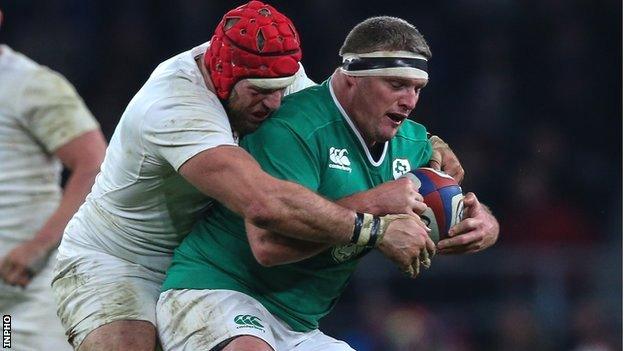Concussion is most commonly reported Premiership match injury
- Published
Archive: How can rugby tackle concussion?
Concussion was the most commonly reported injury during Premiership matches last season, accounting for approximately 25% of the total, according to an annual study.
The Rugby Football Union's Professional Rugby Injury Report,, external first commissioned in 2002, found the overall likelihood of a player getting injured was lower than in any previous season.
But concussion incidents increased 7%.
The RFU said increased awareness and improved management had contributed.
Its chief medical officer, Simon Kemp, said: "The continued rise in the number of reported concussions in the professional game continues to be an area of priority focus for everyone involved in the game.
"Medical staff are all working extremely hard to ensure that we are identifying and managing this complex injury well."
The report also found:
The average time taken to return to play following a match injury was 29 days, which falls within the expected limits.
About 45% of all match injuries were sustained in the tackle. Concussion now comprises 20% of all injuries to the ball carrier, and 47% of all injuries to the tackler.
The number of training injuries fell for the second consecutive season, but 40% of all injuries were sustained during training.
Ten players retired as a result of injury last season, and one retired as a result of illness.
A change in World Rugby rules
From 3 January, World Rugby changed its protocol regarding high tackles during play.
Players making contact with an opponent's head in "reckless tackles" will now be shown a yellow card, and will be punished even if the tackle starts below the shoulders.
If head contact is accidental - for example, if a ball carrier slips into a tackle - a penalty will be awarded.
World Rugby says the new rules "aim to change culture in the sport to ensure that the head is a no-go area".
More from rugby: |
|---|
Six Nations fixtures and Women's Six Nations fixtures |
For the latest rugby union news, follow @bbcrugbyunion, external on Twitter |
- Published14 December 2016

- Attribution
- Published7 October 2016
